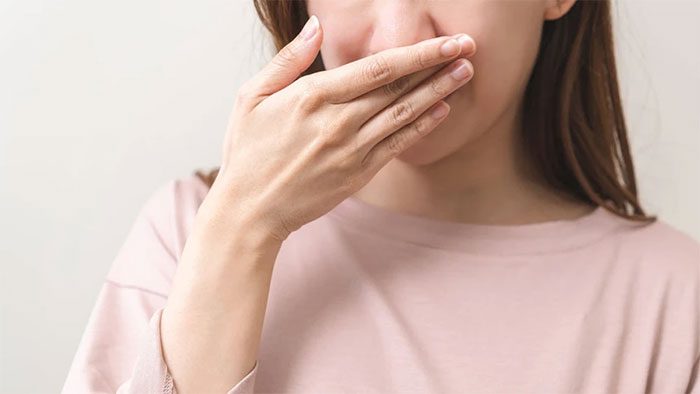Everything from poor oral hygiene to infections can leave you with a sour taste in your mouth.
Understanding the Causes of Sour Taste in the Mouth and How to Address It
Sometimes, you may experience a sour taste in your mouth that disappears on its own. However, in some cases, a persistent sour taste can affect your sense of taste and make eating less enjoyable. This taste disturbance can arise from various causes, ranging from habits to illnesses.
1. Causes of Sour Taste in the Mouth
1.1. Oral Health Issues
Your oral health status can lead to changes in taste perception. When it comes to experiencing a sour taste in your mouth, several possibilities include:
- Dry Mouth Syndrome: Insufficient saliva production can alter the taste of food and leave a sour taste in the mouth. Certain health conditions, medications, and treatments can lead to dry mouth.
- Oral Candidiasis (Thrush): This fungal infection can cause a sour taste in the mouth, along with white patches on the tongue and inside the mouth. Individuals with weakened immune systems are particularly susceptible to oral thrush.
- Burning Mouth Syndrome: This uncommon condition can cause a burning or hot sensation in the mouth and alter taste perception without a clear cause. It may be associated with specific health conditions or medications, and it is often seen in postmenopausal women. Burning mouth syndrome is challenging to diagnose and treat.

Oral thrush can cause a sour taste in the mouth. (Image: Internet).
1.2. Habits
Some habits may also contribute to a sour taste in the mouth. By changing these habits, you can eliminate or prevent this symptom:
- Smoking: Smoking alters taste perception and can leave a sour taste in the mouth. Whether you smoke cigarettes, vape, or use smokeless tobacco products, they can all result in a sour taste or changes in taste perception.
- Dehydration: Not drinking enough water can lead to dry mouth, altering taste perception and potentially causing a sour taste. Be sure to drink at least 6 to 8 glasses of water daily.
1.3. Hormonal Influences
Hormonal issues that can cause a sour taste in the mouth include:
- During Menstrual Cycle: At different phases of the menstrual cycle, some individuals may notice changes in their taste perception. Besides experiencing unusual tastes, you may crave specific flavors, such as salty or sweet foods.
- During Pregnancy: Pregnancy brings significant hormonal changes that can affect taste perception. Many expectant mothers report changes in their taste preferences, especially during the first trimester. These changes may lead to a sour taste in the mouth after eating or drinking.
- Menopause: Similar to pregnancy, menopause also involves hormonal changes that can affect taste perception and create a sour taste in the mouth.

Women are prone to having a sour taste in the mouth due to hormonal changes. (Image: Internet).
1.4. Aging
Your senses, including taste, will change as you age. This is independent of the hormonal changes discussed above and can occur in both men and women.
You may notice that food doesn’t taste as it used to, or sometimes your mouth feels uncomfortable or has a sour taste.
1.5. Zinc Deficiency
Insufficient zinc intake can lead to a sour taste after eating. Several factors can contribute to zinc deficiency, such as a diet lacking zinc-rich foods, certain medical conditions like ulcerative colitis or liver disease, the use of specific medications, or undergoing medical treatments like chemotherapy.
1.6. Gastroesophageal Reflux Disease (GERD)
Gastroesophageal Reflux Disease (GERD) – a chronic condition affecting the lower esophageal sphincter, can cause a sour taste in the mouth after eating. This condition occurs when stomach acid backs up into the esophagus, leading to symptoms like heartburn, chest pain, and a burning sensation in the throat.
Several factors may exacerbate these symptoms, such as smoking, alcohol consumption, fatty or acidic foods, and large meals.

GERD can also cause a sour taste in the mouth, chest pain, and a burning sensation in the throat. (Image: Internet).
1.7. Infections or Illnesses
Fighting infections or illnesses can impact our senses, including taste.
For instance, when we have a stuffy nose from a cold, sinusitis, or COVID-19, you may experience loss of smell or changes in taste, leading to a sour taste in the mouth. Mucus from a persistent cough can also contribute to this sensation.
1.8. Effects of Medications
A bitter or sour taste in the mouth after eating can be a side effect of medications. This side effect may be caused by:
- Medications affecting taste receptors in the brain
- The taste of medications mixing with saliva
- A drug molecule in the bloodstream of the tongue interacting with taste receptors
Common medications that can cause a sour taste in the mouth include:
- Antibiotics: Including ampicillin, macrolides, fluoroquinolones, sulfamethoxazole, trimethoprim, tetracycline, and metronidazole
- Heart Medications: Including various antihypertensives, diuretics, statins, and antiarrhythmics
- Chemotherapy Drugs: Such as cisplatin, cyclophosphamide, and etoposide
- Neurological Medications: Including Parkinson’s disease medications, migraine treatments, and muscle relaxants
- Psychotropic Medications: Including most tricyclic antidepressants, some antipsychotics, anxiolytics, mood stabilizers, and sleeping pills
- Other Prescription and Over-the-Counter (OTC) Medications: Including thyroid medications, antihistamines, bronchodilators, anti-inflammatories, smoking cessation aids, antifungals, and antivirals.

A sour or bitter taste in the mouth can be due to medication side effects. (Image: Internet).
In addition to the above causes, lead poisoning or stress and anxiety can also result in a sour taste in the mouth.
2. How to Eliminate Sour Taste in the Mouth
In most cases, a sour taste in the mouth is not a cause for concern. However, if the sour taste affects your sense of taste and causes discomfort, some of the following remedies may help alleviate the issue:
- Maintain Good Oral Hygiene: Ensure that you brush your teeth at least twice a day and pay special attention to cleaning your tongue, which is often neglected despite harboring many bacteria. Additionally, rinse your mouth with a mixture of 1/2 teaspoon of baking soda or 1/2 teaspoon of salt in a glass of water to better protect your oral health.
- Stay Hydrated: Drinking plenty of water not only keeps your mouth moist but also encourages more frequent urination. This can help eliminate any substances in your body that might be contributing to your symptoms.
- Review Your Medications: If the sour taste in your mouth is due to medication, consider consulting your doctor about the possibility of stopping or switching medications.
- If You Have Gastroesophageal Reflux Disease (GERD): Dietary and lifestyle changes (such as weight loss and avoiding trigger foods) can be beneficial. Acid-reducing medications, H2 blockers, or proton pump inhibitors may also be recommended.
- If You Are Zinc Deficient: Incorporate foods rich in zinc into your diet, such as legumes, eggs, and red meat.
- If You Have Oral Thrush: Treatment methods include using certain medications such as antifungal lozenges or mouthwashes.
- Chew Sugar-Free Gum: Chewing gum can stimulate saliva production, helping to prevent dry mouth. The flavor of the gum may also mask unpleasant tastes.
- Quit Smoking: Regardless of the underlying cause of the unpleasant taste in your mouth, smoking or using tobacco will exacerbate the issue.
Overall, a sour taste in the mouth is typically not a serious concern. However, if the symptoms persist and are accompanied by other unusual symptoms, it is advisable to visit a hospital for examination and treatment.


















































